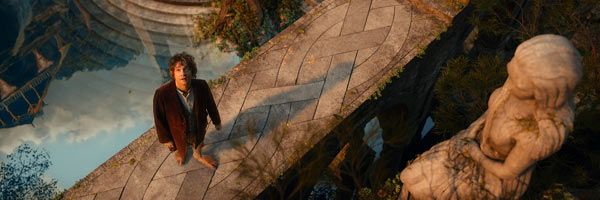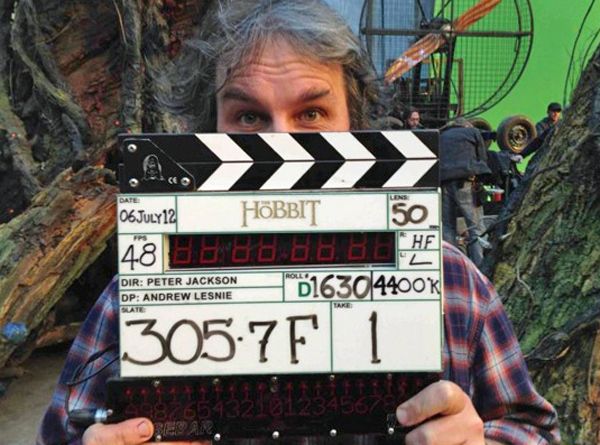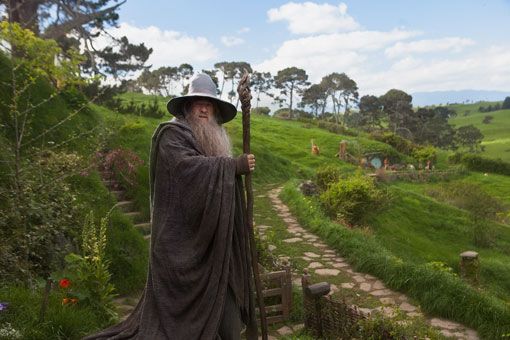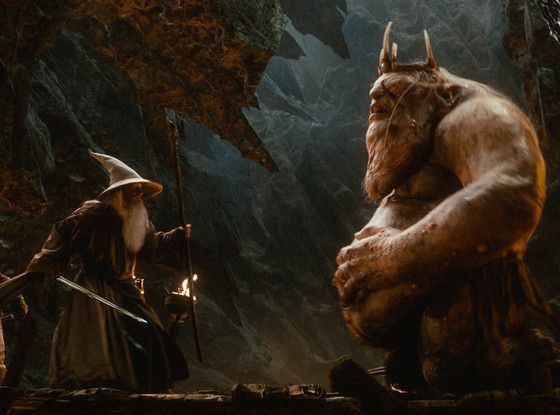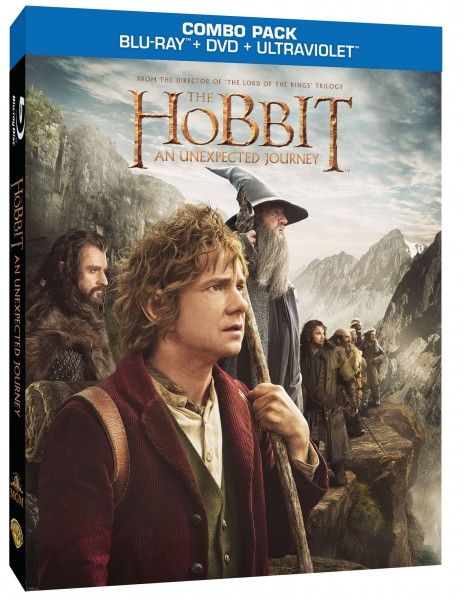The Hobbit: An Unexpected Journey exemplifies the difference between “disappointing” and “bad.” Director Peter Jackson created a modern classic with his Lord of the Rings trilogy, and fans had every right to expect the same genius from the prequel. Sadly, it was not to be: The Hobbit is too long, too bloated and too unsure of its ultimate purpose to rank alongside its fellows. That said, it still captures the essence of J.R.R. Tolkien’s imaginary world, as well as providing reliable entertainment in its own right. Hit the jump for my full review.
As always, Jackson and his team pay the utmost respect to the source material, often lifting dialogue verbatim from Tolkien’s text and aspiring to keep his characters and narrative intact as best they can. The challenges come as polar opposites to the ones faced in The Lord of the Rings. Jackson needed to streamline those other stories, cutting out the extraneous material and concentrating on the necessities. The resulting films felt lean and engaging without skimping on Tolkien’s vision. Here, he’s dealing with one book stretched out over three movies… the same running time that neatly covered the whole trilogy in The Lord of the Rings. Instead of cutting, he needs to pad, dragging down the story and leaving a slow, laborious feeling in its wake.
Unnecessary asides plague the narrative throughout; I love Elijah Wood and Ian Holm as much as the next man, but their flashback framing device does little more than mark time. The same can be said about numerous similar developments: the arrival of Radagast the Brown (Sylvester McCoy), the rise of a new threat called the Necromancer, and a futile attempt to develop the personalities of the thirteen dwarves who accompany Bilbo on his journey. None of them are unwelcome, but you begin to wonder whether we truly needed them, and how much more efficient the movie would be if it didn’t cater to their presence.
I fault Warners for the move: they’ve been jonesing for a reliable franchise after the departure of Harry Potter (and amid the general flailing of their DC Comics properties). Even so, Jackson makes a Herculean attempt to overcome their rampant greed, and while he can’t shake the bloat, I shudder to think what might have happened with a lesser director at the reins.
He gets solid help from a few old friends in the cast. Ian McKellan’s witty Gandalf remains as mischievous as ever, the council of Elrond (Hugo Weaving, Christopher Lee and Cate Blanchett for those keeping score) brings solemn dignity to their expository dialogue, and Andy Serkis almost single-handedly rescues the final third with his sinister Gollum. Martin Freeman makes an excellent addition to their company, playing a young and altogether too proper Bilbo Baggins whom Gandalf railroads into a dragon-slaying expedition with a band of dwarves. The wizard has the big picture in mind – he’s gearing up for the big battle with Sauron, and a dragon might spoil things if it’s still around. This particular specimen evicted the dwarves from their mountain stronghold long ago, and now the heir to the original tenants intends to set things right. He brings twelve companions with him, and since the number thirteen just taunts the fates too much, Gandalf drops the hobbit in their midst to bring a little luck.
Freeman, whose past credits include such put-upon souls as Arthur Dent and John Watson, is an inspired choice. He plays the stammering straight man remarkably well, but also shows reserves of courage and fortitude that slowly awaken during Bilbo’s adventures. Said adventures are gorgeously realized as well, starting with a trio of trolls intent on devouring the company, and moving into the caverns of the Misty Mountains, where a kingdom of goblins makes their unsettling home.
The problem isn’t such moments, which remind you why Jackson is the ideal choice for this material. We simply have to wait far too long to get to them. The remainder of the film wanders hither and yon, creating storytelling cul-de-sacs that serve no real purpose beyond killing time. The Hobbit often loses its way amid such meditations, and while it provides fine company for us in the meantime, the glacial pace wears us down after a while.
As with the Lord of the Rings, we’re only seeing one piece of the puzzle here, with the other two set to arrive over the next couple of years. On the other hand, that costs us the comparative nimbleness of Tolkien’s novel, a blow from which it might never truly recover. Thankfully, the dip in quality doesn’t derail it: it merely goes from a potential masterpiece to a pretty good time at the movies. You can’t fault it for getting the job done; only that it doesn’t do more with such a beloved story.
The disc itself benefits from all the technical bells and whistles that accompanied its theatrical release. The vaunted 48 fps technique is nowhere to be seen here, and that’s a good thing: devoid of that distracting soap-opera sheen, the imagery here looks absolutely stunning. The sound mix is a little less sparkling – rope-a-doping you with quiet dialogue scenes that jar badly with the noise and bombast – though it still works reasonably well. The special features are informative and engaging as expected, topped by Jackson’s lively production blogs and a short piece on the New Zealand locations. Sadly, there’s not much more than that – a few trailers and an access code giving you a sneak peak at the next film – which suggests that Warners’ notorious double-dipping tendencies will continue unabated with some “ultimate edition” in the future. (A 3-D version is included for those with the right equipment, as well as the now-standard DVD and digital copies.) Despite all that, it’s a fine looking Blu-ray, highlighting an unquestionably flawed movie that still has far too much going for it to lightly set aside.

